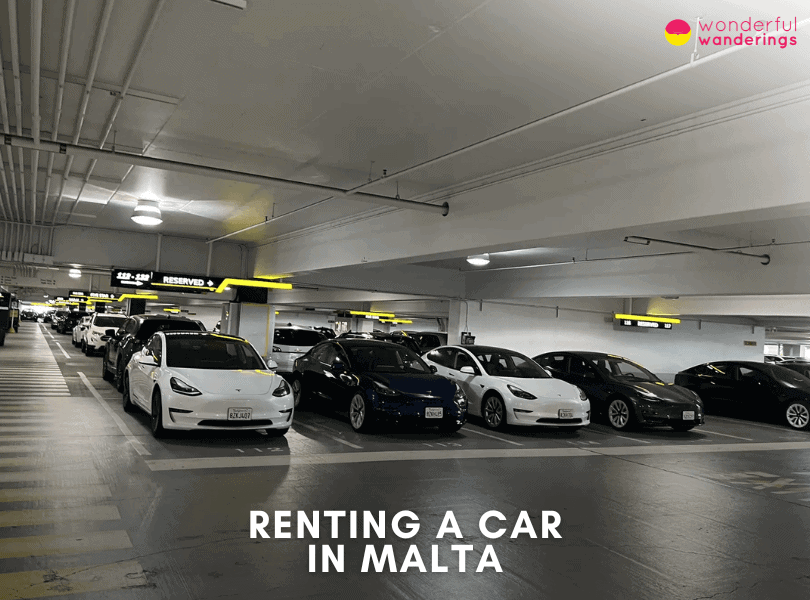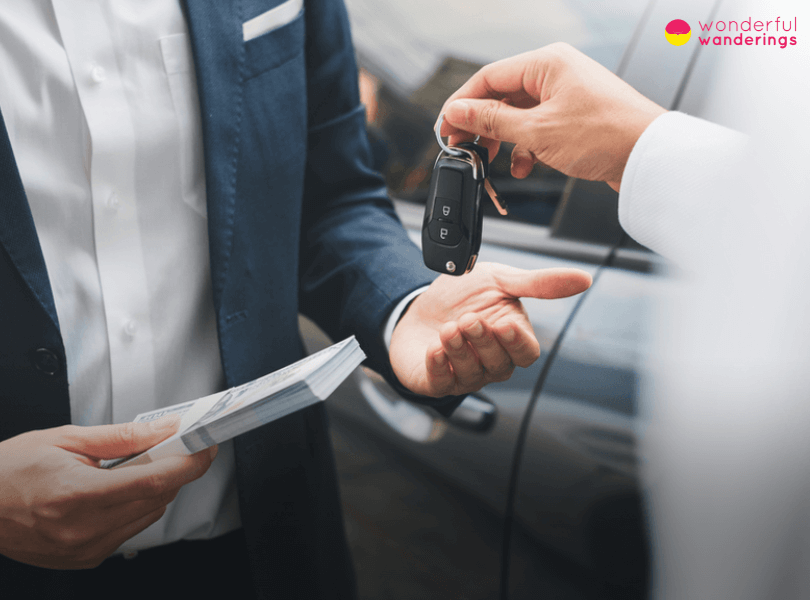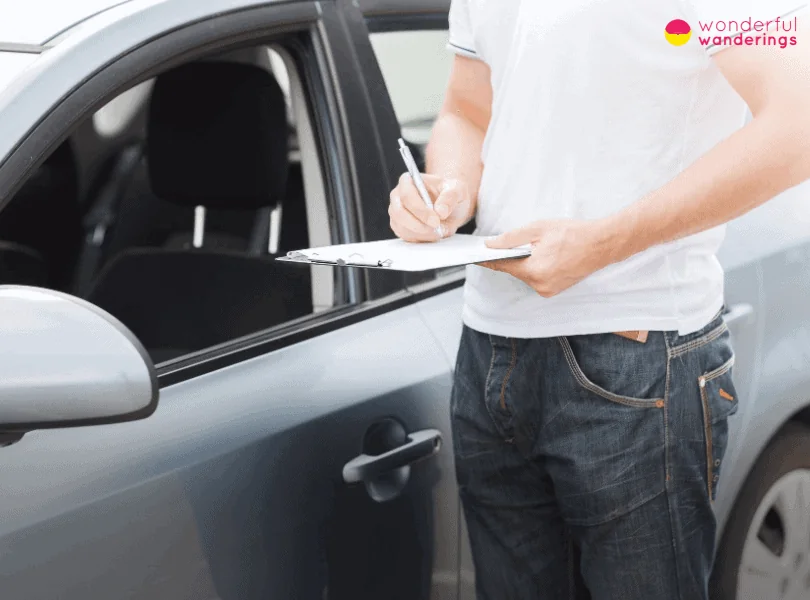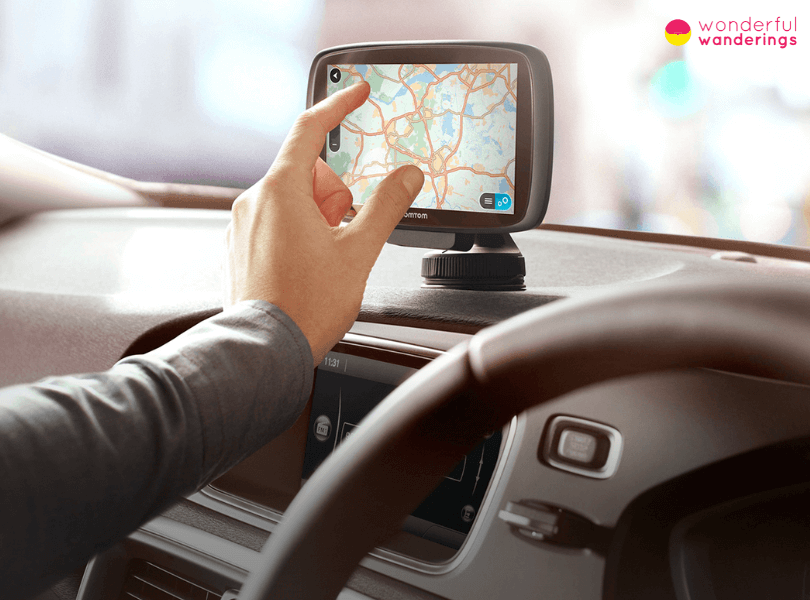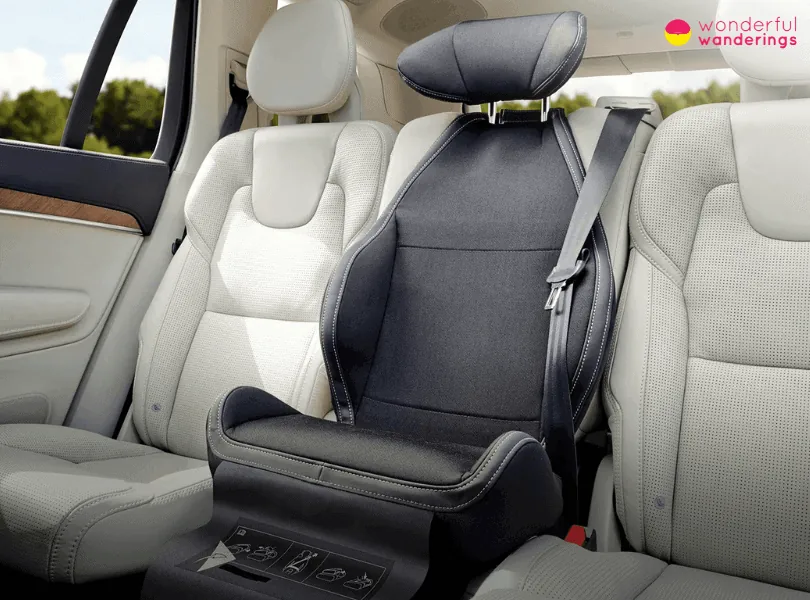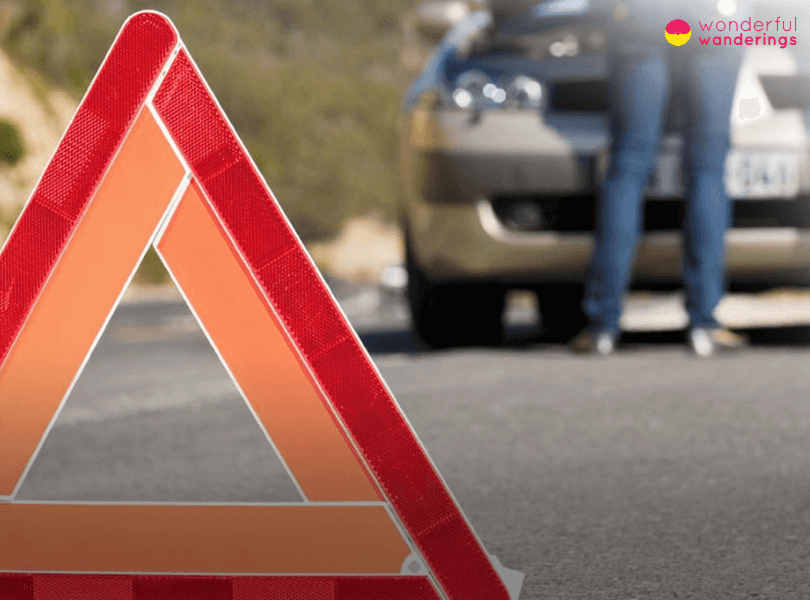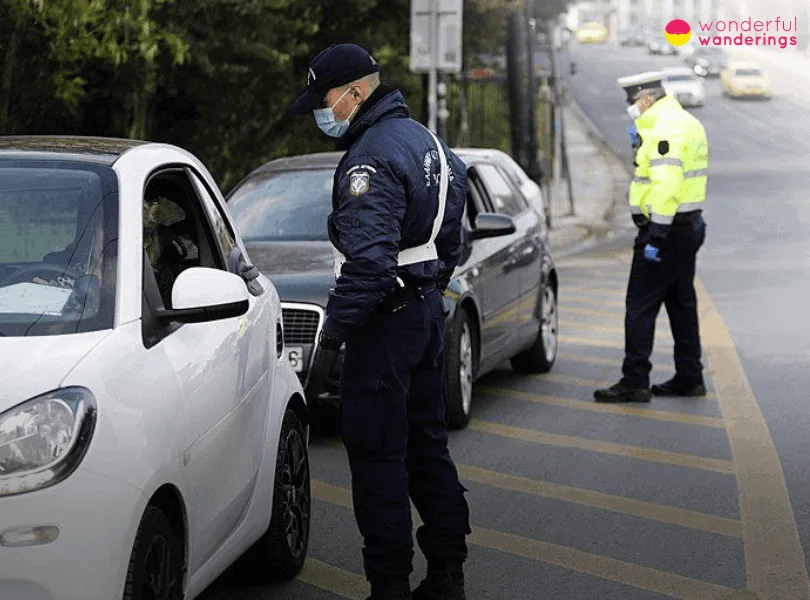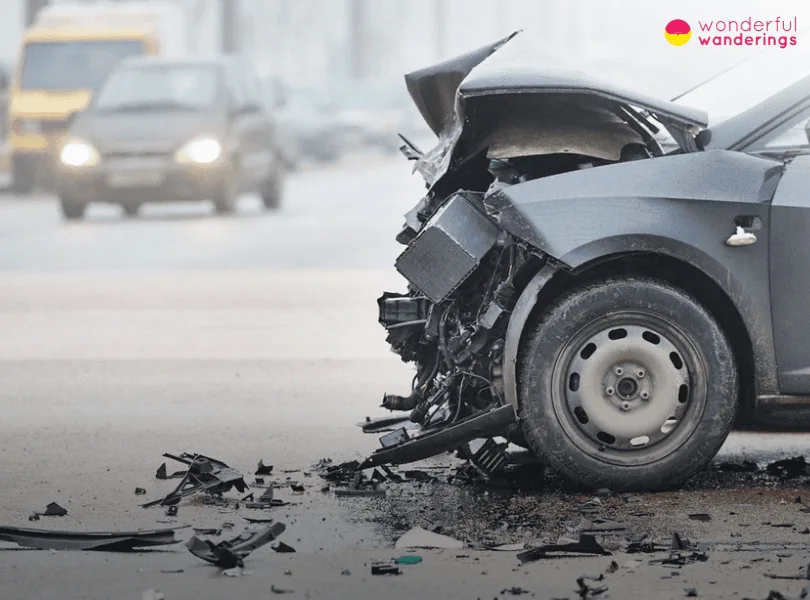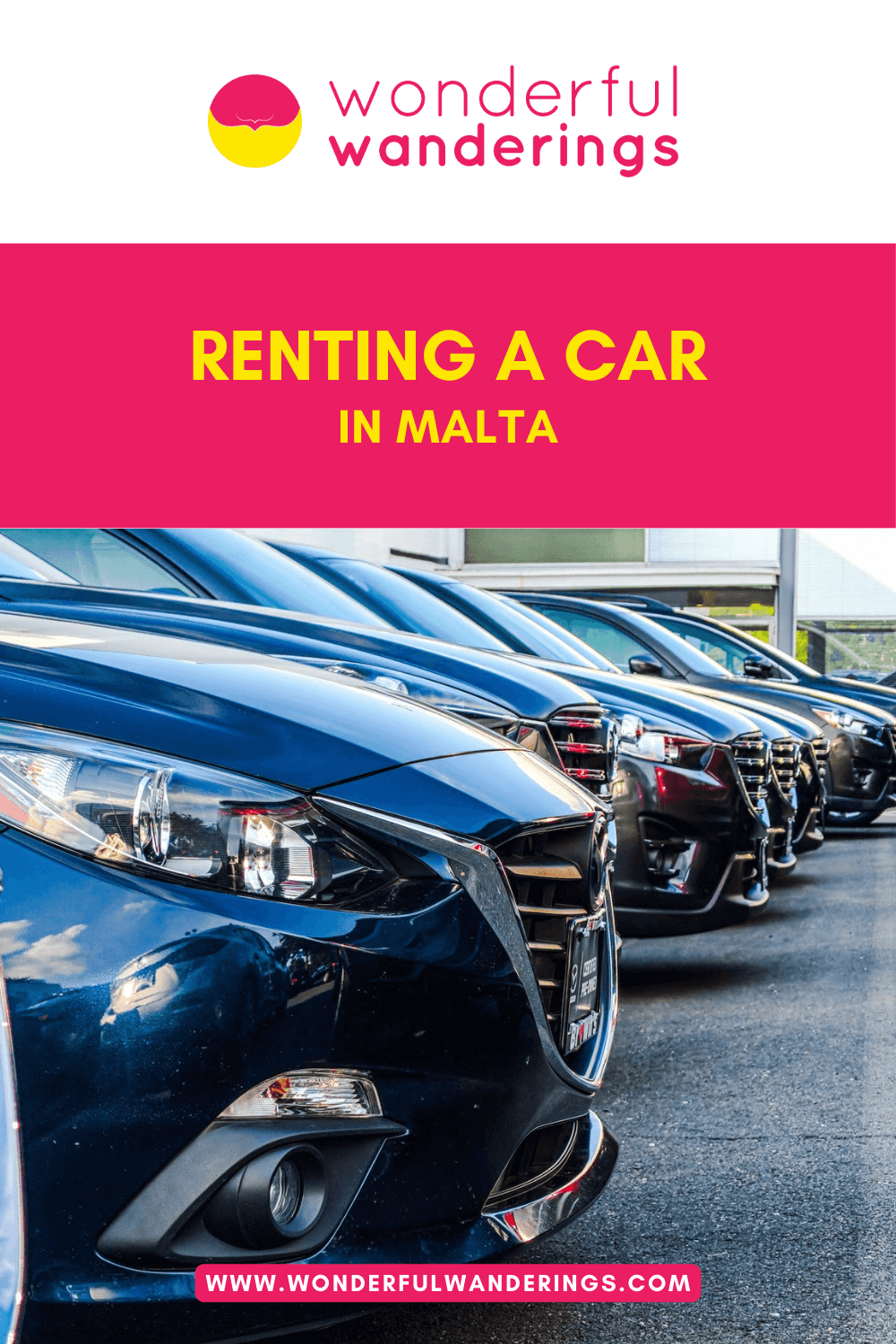Car rental and driving in Malta offers a unique experience for travelers. The country’s road safety, driving etiquette and car rental processes are critical for a smooth journey. Renting a car is advisable for exploring Malta, with its public transport not always matching travelers’ schedules or reaching remote areas. To rent a car, drivers must be at least 21 years old and have a valid license for a minimum of 1-2 years. A credit card is required for a deposit, ranging from €100-€1000 ($113-$1,131, £87-£872). The best rental period is winter (November to March), with lower prices and less demand. Airport pickups are cheaper and more convenient and smaller cars are recommended for Malta’s narrow roads.
Malta has well-maintained roads, but driving can be challenging due to narrow streets and aggressive local driving habits. Tourists should be cautious and familiarize themselves with local traffic laws. Renting an automatic car is recommended for ease of driving. Driving in Malta etiquette includes courteous behavior, adherence to speed limits and parking regulations. Understanding local driving styles and being patient is essential. For exploring, a car offers access to destinations like Mdina, Valletta, Marsaxlokk and Gozo, with each offering unique attractions from ancient cities to scenic coastlines. Driving in Malta is difficult, especially for those used to left-hand traffic. The roads can be congested, with parking often needing help finding. Public transportation or guided tours might suit those uncomfortable with local driving conditions. With caution and adherence to local driving norms, navigating Malta by car can be a feasible and enjoyable way to explore the island.
Contents
- 1. License to rent a car in Malta
- 2. Age and Experience Requirement
- 3. Credit Card Requirements
- 4. Guarantee – Credit card hold
- 5. Best period to rent and book
- 6. Pickup / Return Location and Times
- 7. Recommendations for car size and engine
- 8. Transmission type (Manual or Automatic)
- 9. Fuel choice (Diesel, Gas or electric)
- 10. 4×4 rental in Malta
- 11. RV rentals in Malta
- 12. Car rental Prices in Malta
- 13. What to think before selecting a car rental company in Malta?
- 14. Top car rental companies in Malta
- 15. Save money on automobile rentals in Malta
- 16. Typical Opening hours of car rental companies in Malta
- 17. Car rental scams in Malta
- 18. Cross-board rentals
- 19. Car Rental Insurance
- 20. Roadside assistance
- 21. GPS Sat Nav Navigator
- 22. Additional driver charges
- 23. Child Seats. Safety rules with car rental in Malta
- 24. Take pics of the car during pick-up.
- 25. Mandatory equipment in rental cars in Malta
- 26. Tolls in Malta and rental cars
- 27. Traffic fines
- 28. Car rental breakdown
- 29. Fuel refill options
- 30. Different Drop-off locations (Oneway Rentals)
- 31. Car rental Accident
- 32. Double-read the car rental terms and conditions.
- 33. Watch YouTube videos of other people driving a car in Malta
- 34. Plan Your Trips
1. License to rent a car in Malta
To rent a car in Malta, drivers must be at least 21 years old and hold a valid driving license for at least 2 years. Some car rental companies may have additional restrictions for young drivers under age 25, such as requiring them to pay a surcharge. The maximum age to rent a car is typically 70 years old. When picking up a rental car, show a valid driver’s license, passport or other accepted form of ID and a major credit card in your name. Debit cards and cash are usually not accepted. Visitors must purchase the mandatory third-party liability insurance that comes with the car rental. This is known as a Collision Damage Waiver (CDW) and covers any damage to the rental vehicle. The CDW does not cover damage to other vehicles or property. It is highly recommended to purchase additional insurance options for complete coverage.
2. Age and Experience Requirement
The minimum age to rent a car in Malta is 21. Some car rental companies may have higher minimum age requirements, such as 23 or 25 years old. No universally enforced maximum age limit exists to rent a car in Malta. Drivers over 70 may be subject to additional fees or restrictions from car rental companies. Most car rental companies in Malta require renters to hold valid driving licenses for at least one year. Some companies need at least two years of driving experience. This experience must have been earned in the driver’s country of residence or issuance of their license. If someone has a U.S. license but is a resident of the U.K., they would need at least 1-2 years of licensed driving experience in the U.S. International driving permits are usually accepted in Malta.
3. Credit Card Requirements
Most rental companies in Malta require a valid credit card in the main driver’s name. Rental companies use this credit card to place a hold on funds as a security deposit in case of damages or other fees. Some rental companies may accept debit cards or other payment methods instead of credit cards. Visitors should thoroughly check the payment policies and specify if they do not have a standard credit card. Some smaller local companies can make exceptions and accept debit cards, cash deposits or voucher payments if informed ahead of booking. Larger international chains usually require an eligible credit card to complete online and at pickup reservations. If drivers lack this standard card, they should contact companies about alternatives before booking. Being flexible on the rental car company and type can also increase the chances of securing a car without a credit card in Malta. Tourists and residents without cards can still navigate renting a car by verifying alternate payment methods in advance. Adjusting company choice and vehicle preferences can also facilitate credit-free rentals for those hoping to explore Malta on four wheels.
4. Guarantee – Credit card hold
Drivers should be prepared for the rental company to place a hold on their credit card as a security deposit. This deposit guarantees against any damages, traffic violations or extra fees incurred during the rental period. The specific amount held can vary greatly depending on factors like the rental company, vehicle type, insurance selections and length of rental.
Car rental deposits in Malta range from €100-€1000 ($113-$1,131, £87-£872). Economy vehicles may only require €100-300 ($113-$339, £87-£261) held, while higher-end cars can prompt deposits of €500 ($565, £435) or more. Rentals longer than a few days also often have increased deposit amounts. Those waiving the rental company’s insurance, leaving them liable for more potential damages, will also see much higher deposit holds. Some agencies may detail standardized deposit policies on their websites or rental contracts. The funds on hold reduce the available credit or balance the renter has on their card but are not charged. The hold is released when the vehicle is returned as originally rented, with no new fees or damages reported. This can take up to 10 business days after the rental ends. Renters lacking the available funds or credit for a deposit hold may not be allowed to complete their reservation, even with a valid credit card on file.
5. Best period to rent and book
The best period to rent a car in Malta is during the off-peak winter months from November to March. During this period, tourism and demand for rental cars drop. Prices are at their lowest compared to the popular summer high season. Renters can find substantial savings on the rental and extras like insurance. The winter also sees fewer crowds, allowing visitors to enjoy attractions and scenic drives better. Renters should aim to book their car 2-3 months in advance. As an in-demand tourist destination, Malta’s rental fleet gets reserved quickly, especially for summer travel. Booking far ahead ensures access to the best rates, vehicle options and companies. Last-minute rentals often carry a significant premium in price. Limited availability may also mean settling for less ideal rental terms just to secure a car. Travelers need a reservation during the sell-out period before taking advantage of a vehicle. Some flexibility in an itinerary can be beneficial. Having guaranteed wheels locks in the freedom to explore Malta at one’s own pace.
6. Pickup / Return Location and Times
In Malta, it is generally cheaper and more convenient to pick up and return the vehicle at the airport rather than in town. Airport pickup allows the collection of rental cars right away upon arrival, while town locations may involve extra transportation or delays. Airport locations often have more inventory and competition between rental companies, resulting in better rates than limited downtown branches. Daytime pickups are preferable to nighttime, as some companies charge extra fees for after-hours vehicle releases, usually applying to pickups after 6 or 7 pm. It is recommended to arrive and pick up the rental car during opening daytime hours to avoid surprise charges. Returning the vehicle before the nightly cutoff times can prevent late return penalties that some companies charge. The cheapest deals are for same-location roundtrips. Also, opt for a mid-week rental, as weekends carry premium pricing in Malta, a popular tourist destination. Reservations offer the best available discounts as well.
7. Recommendations for car size and engine
When choosing a car for travel in Malta, the vehicle size and engine should be selected based on the island’s compact geography and narrow roads. Congestion is common in populated areas. Small to mid-size sedan models are best suited for maneuvering busy streets and tight parking spaces. Recommended rental cars for Malta include economy choices like the Toyota Yaris, Nissan Micra and Opel Corsa, which offer adequate engine power plus high fuel efficiency. The subcompact body frame can easily squeeze down slim one-way roads and U-turns. For more passenger capacity, the mid-size Ford Focus, VW Jetta or Toyota Corolla are sensible picks, allowing seating for four adults. Upscale European brands like Mercedes, BMW and Audi should be avoided as large vehicles struggle to navigate villages and damage risks escalate on narrow lanes. Unless extended road trips are planned, a small displacement engine between 1200cc and 1600cc offers the best size and strength for Malta’s short point-to-point drives. For hassle-free maneuverability, a manual hatchback or sedan with a standard transmission allows greater control than a wide SUV or van, which requires more precision.
8. Transmission type (Manual or Automatic)
An automatic transmission is the best option for renting a Malta car. Automatic transmissions have become common in Malta; most rental cars will have this transmission type. Automatics are easier to drive than manuals, especially for tourists who may not be used to driving a manual transmission car. They allow visitors to focus more on navigating Malta’s narrow roads and heavy traffic rather than worrying about shifting gears properly. Automatics also work better in stop-and-go traffic, which is common in Malta’s urban areas. Automatics tend to have a better fuel economy these days compared to manuals. Automatics also have more advanced safety features in many models, like emergency braking, lane keep assist and adaptive cruise control. These features are useful for driving in a new country. Manuals used to be cheaper. Automatic rentals in Malta are very competitively priced. Considering the ease of driving, efficiency and safety benefits, renting an automatic transmission car is highly recommended for most tourists visiting Malta.
9. Fuel choice (Diesel, Gas or electric)
When renting a car in Malta, gas is the most common and widely available fuel type among diesel, Gas or electric. Most rental cars run on unleaded petrol, found at gas stations across Malta and Gozo. Diesel is also easy to find, though fewer rental cars and gas stations offer diesel than unleaded petrol. Diesel rental cars are usually limited to larger vehicle classes like minivans and SUVs. If renting a diesel vehicle, pay attention to the fuel type when refueling to avoid mistakes. Some rental companies may have diesel surcharges, given its less prevalent availability. Liquefied petroleum gas (LPG or Autogas) is a third fuel type offered to a minimal degree for rental cars in Malta. Only a handful of rental companies offer LPG vehicles since the fueling infrastructure is not widespread. LPG models are usually bi-fuel vehicles that can switch between petrol and LPG. Renters must refuel LPG from designated Autogas pumps, which are rare compared to petrol and diesel. LPG rental cars are not very convenient for most tourists. Electric rental vehicles are currently non-existent in Malta. The charging infrastructure to support electric tourism rentals does not yet exist.
10. 4×4 rental in Malta
Renting a 4×4 is not necessary for most visitors to Malta. Malta’s road infrastructure caters well to standard passenger cars. Over 90% of Malta’s roads are paved, meaning most destinations are accessible by a typical sedan or hatchback rental car. These standard cars have enough ground clearance and power to handle Malta’s hilly terrain. Unless plan to drive on unpaved roads or primitive dirt tracks frequently, a 4×4 will provide minimal benefit. The higher clearance and all-wheel-drive of a 4×4 are not needed on normal roads. 4×4 rental rates are more expensive, less fuel efficient and limited availability compared to standard rental cars. Quality paved highways connect most tourist sights, like Mdina, Valletta, beaches and historic sites and visitors can rely on a cheaper, standard rental car for transportation. A 4×4 is not essential in Malta for airport transfers and day-to-day itineraries. Unless venturing onto backroads, save rental budget and opt for a standard sedan or hatchback offered by all major agencies on the island.
11. RV rentals in Malta
RV and camper van rentals are currently very limited in Malta. The islands have seen growth in tourism infrastructure, but the RV rental segment has yet to develop significantly. The narrow, winding roads and compact villages that characterize much of Malta present challenges to navigating large recreational vehicles. RV rentals through major international agencies are non-existent within Malta. Several local Maltese companies have recently begun offering small camper van rentals for self-drive holidays. These camper vans built on a standard van chassis provide basic camping amenities like beds and cooking equipment. Legitimate RV rentals may be arranged by taking the ferry to Sicily, Italy, where RVs can be rented, though this requires extra logistics. Malta makes up for it by having various hotels, resorts and scenic campgrounds to meet various lodging preferences. Taking a camper van is one way to replicate RV-style accommodations partially, but RVs are currently not feasible for visitors driving independently around Malta.
12. Car rental Prices in Malta
Rental car pricing in Malta fluctuates substantially based on vehicle type, rental term length, including extras like GPS units or car seats and seasonal demand trends.
Compact vehicles like Toyota Aygo or similar make rent every week for €180-220 ($204-249, £157-192). These no-frills cars adequately serve solo or couple travelers on a budget while allowing flexibility of self-guided transportation across the islands. As barebones base models, though, compact cars may lack the comforts and power expected stateside. Midsize options like Fiat Panda and Opel Corsa rent daily from €25-40 ($28-45, £22-35) on average, depending on automatic vs manual transmission and supplemental insurance. These models balance economy with modest space for small groups and families needing luggage capacity plus the occasional car seat. Premium class rentals fetch over 50% premiums from compacts. Specialty vehicles such as SUVs with higher ground clearance for rugged roads or luxury makes like Mercedes mix limited supply with elevated demand, driving daily rates closer to €100+ ($113+, £87+) even during off-peak seasons on shorter rent. These reward splurging for special occasions. Securing a rental car in Malta is generally cheaper than in other Mediterranean destinations, although taxes can add 18-26% on finalized bills.
13. What to think before selecting a car rental company in Malta?
There are five major things to consider before selecting a car from a rental company in Malta. Firstly, inspect online reviews examining potential issues with availability at pickup despite confirmed reservations. Limited fleets and overbooking occasionally leave visitors stranded upon arrival. Agencies with consistent capacity earn favor through reliable service. Verify clear communication channels exist to modify existing bookings if needed. Secondly, compare rate transparency across vendors while remembering headline quotes exclude taxes and charges added at pickup. Vague pricing allows buried fees to bloat final tabs unexpectedly. Responsible agencies emphasize all-inclusive rates encompassing taxes and basic insurance without surprising upticks. Thirdly, consider vehicle inspection rigor at key phases – returning previously damaged cars threatens renters with bloated repair responsibility if deficiencies are documented as new instead of pre-existing. Honest vendors start each rental with examined condition reports. Fourthly, understand how agencies handle traffic violations accrued during trips. Some fold fines directly into final charges, while others provide reasonable notification periods, allowing payment to national authorities first, avoiding costly service fees. Lastly, examine extra rate reductions available through established travel loyalty programs or credit card benefits before assuming listed prices as absolute bottom-line costs. Stack savings through partnerships supplementing baseline promotions.
14. Top car rental companies in Malta
There are 4 top car rental companies in Greece. Firstly, Avis is considered one of Malta’s top car rental companies. Avis offers a large selection of rental vehicles at competitive rates. Customers highlight their excellent customer service and streamlined rental process as advantages. As an international brand, Avis provides familiarity and consistent quality service across their Malta locations. Secondly, SIXT receives favorable ratings as a top agency for car hires in Malta. SIXT provides premium vehicles like BMWs and Mercedes in their specialty fleet. Their all-inclusive pricing and low fuel policies receive praise from tourists. Renters describe SIXT as professional and reliable when renting high-end cars on the island. Thirdly, Europcar is regarded as one of the best car rental choices. As another reputable international company in Malta, customers appreciate Europcar’s trusted service and range of vehicle classes from economy to luxury. Renters are consistently satisfied with Europcar’s staff and vehicle quality each time they rent in Malta. Lastly, local rental firm AutoUnion also earns top reviews than other Maltese agencies. AutoUnion provides cheaper rates than big brands but maintains helpful staff and a decent fleet. Their smaller size also allows them to offer flexible services catered to individual renter needs. Their mix of value, vehicle types and customer service explain the continued praise and referrals they receive.
15. Save money on automobile rentals in Malta
Visitors can save money on automobile rentals in Malta in 4 main ways. Firstly, the best way to save money on Malta car rentals is to compare rates across multiple agencies. Sites like DiscoverCars allow visitors to compare cheap car rental deals from various companies all in one place. This makes it fast and easy to find the lowest price on your preferred rental class and dates. Secondly, consider the length of the rental period when searching for deals. Extended rentals over a week or longer sometimes have better rates than short-term rentals. Opting for a longer rental can lead to overall savings if the daily rate is discounted. Thirdly, renting a car in Malta during the off-season winter months is almost half the price of popular summer rentals. Malta remains pleasant year-round, aiming for a February pickup over August, which can stretch the holiday budget further. The cost difference in low versus high-season rentals is substantial. Lastly, renting a smaller economy-class vehicle like a Fiat Panda will be considerably cheaper than luxury sedans or 8-passenger vans. Sticking to the most compact and fuel-efficient rental car that fits your group size will minimize expenses.
16. Typical Opening hours of car rental companies in Malta
The opening hours of most major car rental companies in Malta generally run from 8.00 or 9.00 AM until 6.00 or 7.00 PM, Monday through Friday. Weekend hours are often reduced, with locations closing earlier on Saturdays at 1.00 or 2.00 PM. Sundays have even shorter hours, usually 10.00 AM to 1.00 PM, for pickups and returns only. Exact timings can vary slightly by individual rental operators. This Monday-to-Friday full-day schedule with partial weekend hours is standard across brands like Avis, Hertz, Europcar and Budget. Smaller local agencies may stay open an hour later on selected weeknights. During the busy summer tourist season from June through September, some car rental locations extend their weekday closing time until 8.00 or 9.00 PM to accommodate higher demand. They may also keep weekend hours longer, especially on Saturdays. Summer weekend hours might run 8.00 AM to 6.00 PM on Saturdays and 8.00 AM to 2.00 PM on Sundays. It is less common to see full Sunday hours equivalent to weekdays. Malta International Airport offers 24-hour rental car return access regardless of the terminal opening times. After-hours returns are made to secure key drop boxes. Brick-and-mortar locations adhere to these schedules and online reservations remain open 24/7 for early booking.
17. Car rental scams in Malta
There are four common car rental scams in Malta. Firstly, Smart Car Rentals, located at Malta International Airport, has been accused of charging non-waivable excess insurance fees over €2000 ($2,185, £1,744) and adding hidden costs onto prepaid reservations. A rental experience on TravelMoreLand details the company OK Mobility baiting a customer with a cheap online prepaid rate quote and then demanding an additional fee upon pickup to release the vehicle. Secondly, unauthorized agents approach newly arrived travelers outside the airport arrivals terminal, offering discounted rental deals. After securing a booking, regular prices are revealed later at the legitimate rental counter. Thirdly, a tactic where renters reserve a certain vehicle class online, like an intermediate sedan, but the agency forces them to accept a smaller economy car with inferior luggage capacity upon pickup unless they immediately cover an “upgrade fee” to get their originally booked car class. Lastly, a car rental that unexpectedly substitutes older vehicles with high mileage or existing damage for the customer’s confirmed rental car denies responsibility by claiming other renters kept the reserved car longer or simply lack availability now for the original class despite the prior booking.
18. Cross-board rentals
Cross-border rentals, where tourists pick up a rental car in one country and drop it off in another, are unfortunately not very feasible in Malta currently. As an island nation, the only way to drive into another country is by ferry to Sicily, Italy. The major international car rental companies explicitly prohibit taking vehicles on ferries without pre-approval. Bringing a rental car to another country often invalidates insurance coverage as well. Local Maltese rental firms have similar restrictions against cross-border usage. These limitations make a traditional rental car impractical for one-way intercountry trips. Specialized tour companies offer packaged self-drive holidays starting in Malta and touring through Mediterranean destinations like Italy by ferry. Tour participants drive designated rental vehicles to cross borders on these guided trips. Visitors must return their Malta rentals on the islands before boarding any ferries as a walk-on passenger. Once arriving at the Italian port, independent car rentals can be coordinated locally in Sicily or beyond. Visitors may want to consider alternatives like hiring a driver or researching multi-country driving tours.
19. Car Rental Insurance
Malta has two common car rental insurance packages. The basic insurance included with all rentals is third-party liability insurance, which covers damage or injury caused to other people or property. Collision damage waiver (CDW) is also mandatory in Malta, which reduces the deductible (excess) in case of damage to the rental vehicle to €500 ($565, £435). Economy vehicles may only require €100-300 ($113-$339, £87-£261) held, while higher-end cars can prompt deposits of €500 ($565, £435) or more. Additional options purchased at the counter include theft protection, which reduces the deductible to zero in case of theft, for €7-9 ($7.91-10.17, £6.10-7.84 ) per day. Personal accident insurance (PAI) can also be purchased for €8 ($9.04, £6.96) per day to cover medical costs in case of injury. Some rental companies may also offer ‘Super CDW’ locally to reduce the deductible to as low as zero. Another alternative car rental insurance option is to purchase a third-party policy from an insurance provider. This can save up to 50% compared to purchasing additional insurance directly from the rental company. This option may provide the most cost-effective insurance coverage for your rental vehicle in Malta.
20. Roadside assistance
Adding roadside assistance when renting a car in Malta is highly recommended. The narrow, winding roads on Malta’s islands increase the likelihood of incidents like breakdowns, flat tires, running out of fuel, losing keys and battery jump starts compared to wider highways. Roadside assistance can promptly dispatch support vehicles to the exact GPS location should any issues occur. This provides vital peace of mind for drivers unfamiliar with the area. Roadside assistance in Malta typically costs €5-15 ($5.65-16.97, £4.35-13.08) for the entire rental period when booked upfront online. Opting in at the counter may cost slightly more. Most car rentals in Malta last 3-7 days for tourists, which equates to €2-5 ($2.26-5.65, £1.74-4.35) extra per day for robust emergency support. If not pre-arranged, roadside service can cost over €100 ($113, £87) on the spot if calling for tow trucks or locksmiths on their own after an incident.
It is recommended to add a GPS Sat nav unit to a rental car when driving in Malta. The narrow, winding streets and confusing intersections in Maltese cities and towns can be tough to navigate, even with the help of maps or mobile apps. An in-dash GPS unit can make getting around easier and reduce driving frustration. Most rental car companies in Malta do not include built-in GPS units as standard, so will likely need to rent one separately. The cost to add a GPS unit from the rental company ranges from €5-10 ($5.65-11.31, £4.35-8.72) daily. Some rental providers may include the unit for free if renting for an extended period. There are also options to rent portable GPS units from third-party companies that may be more budget-friendly over longer rentals.
22. Additional driver charges
Car rental companies in Malta charge €5-15 ($5.65-16.97, £4.35-13.08) per day for an additional driver on top of the base rental rate, with the exact fee varying somewhat between companies. Only one additional driver is allowed and the additional fee applies for all vehicle groups except the Compact SUV, which costs €11.80 ($13.36, £10.30) per day up to a maximum of €82.60 ($93.44, £72.03) per rental to add a second driver. On top of their normal rental rates, a standard charge of €8 ($9.04, £6.96) per day for drivers over 70 or between 21-22 years old. The Mex Rent a Car terms for Malta are similar, with a €6 ($6.78, £5.22) per day charge for each extra driver added to the rental contract. Some companies may also set a maximum cap on the extra driver surcharge for longer rentals. For a few days, it may just add €15-30 ($16.97-33.93, £13.08-26.16) to the total rental cost, but for two weeks, an additional driver could cost over €100 ($113, £87) extra.
23. Child Seats. Safety rules with car rental in Malta
The child seat requirements in Malta distinguish between infants and young children under three years old and older children aged 3-12 years. For infants and toddlers under three years old or less than 150cm in height, an appropriate rear-facing baby car seat or convertible seat is required by law. These typically cost €23 ($27, £22) per rental. For this young age group, it is best to use an infant carrier seat for babies under one year old and under 20 pounds (9 kilograms). Then, transition to a rear-facing convertible seat that allows extended use as the baby grows, supporting babies from 5-40 pounds (2- 18 kilograms) and up to 50 pounds (22 kilograms) rear-facing before moving to the forward-facing position. These seats grow with children as they get older. A forward-facing seat is not recommended for older babies and toddlers aged 1-3 years and they should remain rear-facing.
For children aged 3-12 years or between 150-135cm in height, a forward-facing car seat or booster seat is required by law if traveling in the front seat. These cost €15 ($18, £14) for rental. Many options exist in this category, from combination seats with 5-point harnesses to high-back boosters using the vehicle’s seat belts. The goal is to position the seat belt correctly across the child’s body, with the shoulder belt crossing the chest and the lap belt low over the hips. Rental agencies can help select appropriate seats based on the child’s height and weight.
24. Take pics of the car during pick-up.
Taking pictures of a rental car during pickup in Malta is highly recommended to document any existing damage for protection in case of any incidental scratches or dents during the rental period. Renters should “make sure to include every scratch and damage” when taking photos, including fuel level, to show the car’s pre-rental condition. This protects renters from potentially being charged for damages they did not cause if the vehicle gets returned with new dents or paint scratches that were already there at pickup and are only noticed later. Having dated time-stamped photos helps dispute any unfair damage claims. Carefully photographing any dents, scratches, paint chips or interior damage on a Malta rental car from all angles, with date stamps, is a smart protective measure before driving off the rental lot.
25. Mandatory equipment in rental cars in Malta
There are four mandatory equipment in Malta. Firstly, no compulsory equipment is required by law for rental cars in the country. Some safety add-ons are recommended based on who is driving and road conditions. Basic third-party liability insurance is included. Purchasing further protections like collision damage and theft waivers is advisable to minimize financial risks in case of any incidents with the rental car in Malta. Secondly, child safety seats are mandatory. Infants and toddlers under three years or 150cm tall require appropriate rear-facing restraints, while older kids need forward-facing seats or boosters until they are 135cm tall. These cost €23 ($27, £22) to rent. Thirdly, all passengers must wear seat belts. Beyond legal requirements, other useful extras depend on the rental and journey. Hands-free phone mounts allow safer navigation, costing €15 ($18, £14). GPS devices also make exploring easier and are available for €10 ($12, £9) per day. Considering Malta’s narrow roads, a small vehicle is recommended for easier parking and maneuvering. Lastly, an international driving permit for €15 ($18, £14) proves useful if stopped by police since Malta recognizes these alongside regular licenses.
26. Tolls in Malta and rental cars
No toll roads or highways require payment in Malta. The road system on the islands does not include any toll highways, bridges or tunnels that rental car drivers would need to pay to use. Some streets in major cities do have parking meters. Parking meters are installed on many main streets in urban areas like Valletta, typically allowing 1-2 hours of parking before needing to pay more or move the vehicle. The rates can vary, but drivers should expect to pay €1-2 ($1-2, £1-2) for an hour of street parking in prime locations based on parking signs. Fines for overstaying meters or illegally parking start at 25 € ($29, £24). Some cities require paid entrance permits for access by car like the 5 € ($6, £5) tax to enter Valletta in a rental vehicle. This is a fixed entrance fee rather than a toll peruse. Parking and road use are generally accessible outside urban areas, besides the taxes and insurance costs bundled into rental rates.
27. Traffic fines
Driving in Malta comes with the risk of receiving traffic fines, especially when renting a car. For parking fines, if receive a ticket, it will likely not have a contravention number printed on it. The authorities can still process the fine based on the license plate. When renting a car, the rental company will receive notification of the parking fine. They will then charge = the provided credit card an administration fee, usually 20-30 € ($25-35, £20-30), plus the amount of the fine itself, which can range from 25-100 € ($30-120, £25-100) depending on the violation. If did not provide a credit card, the rental company will invoice for their fee and the fine. It is crucial to pay these promptly to avoid further legal action. For speeding fines or other moving violations, the process is similar. The car rental company will be notified based on the license plate and charge their administration fee plus the fine. Speeding fines in Malta start at 100 € ($120, £100) and go up significantly for excessive speeding over the limit. Major violations like reckless driving can also involve court fees and license suspensions in more serious cases. If any traffic fines go unpaid by the driver, the rental car company is still responsible for providing the driver’s details and settling the fines with the authorities. Failure to do so can result in legal action against the rental company. They have a strong incentive to pursue drivers for reimbursement of any fines and fees. For foreign drivers, the rental company or Maltese authorities may continue issuing invoices or legal notices related to unpaid fines for up to a year. This can be inconvenient and costly to deal with if not addressed promptly.
28. Car rental breakdown
There are four main ways to deal with car rental in Malta when it breaks down. Firstly, remain calm and safely pull over to the side of the road. Turn on hazard lights to alert other drivers and try to stop in a visible location. If the breakdown has caused the car to stop in a hazardous area like a tunnel, exit the vehicle carefully and stand behind a guardrail while awaiting help. Secondly, contact emergency services by calling 112 to report your breakdown. Provide details on the exact location and the issue with the vehicle. Emergency operators can dispatch police or roadside assistance if needed to help secure the area or transport the car to a garage. Thirdly, contact the car rental company directly per the instructions in the rental agreement. Most rental companies in Malta provide 24/7 roadside assistance hotlines to call in case of a breakdown or accident. Specify the exact location, the make/model and license plate of the rental car and a description of the issue if known. The rental company can then coordinate sending roadside help like a tow truck or mechanic to the location. Do not exit the vehicle if stopped in an unsafe area like a roadway. If possible, exit and wait in a safer location while remaining visible to approaching traffic. Switch on the phone’s flashlight or use hazard lights to remain visible at night.
Lastly, after the car has been towed, obtain a detailed tow receipt from the rental company or roadside assistance provider. This should document any charges or fees associated with the tow and can be important for insurance claims. Visitors need to work with the rental company to either continue the rental with a replacement vehicle or terminate early if the breakdown cannot be quickly repaired. Make sure to take photos documenting any external damage to the car before it is towed. This creates proof needed when settling any costs related to the breakdown.
29. Fuel refill options
When renting a car in Malta, most rental companies offer a “full-to-full” fuel policy option. There is no price difference or discount for selecting this prepaid fuel option over refueling yourself. It can lead to overpaying if returned with extra fuel. An alternative is the “full-to-empty” option, where pick up the car full but return it empty without needing to refill. The main fuel refill option rental companies provide is the prepaid “full-to-full” tank. This allows skipping refueling yourself before drop-off. The cost is charged upfront with your rental booking. Some rental agencies may partially refund based on the remaining fuel, but policies vary. There are also cases where, despite returning “full”, renters get charged for a top-up due to the fuel gauge not reading 100% full. This can be inconvenient and seem unfair after prepaying for a full tank. A better but less common option is the “full-to-empty” tank. This allows to return the car with little to no petrol left. It is the most cost-effective option matching actual fuel consumption. It requires manually refueling yourself to fill up the tank initially. This option may also have higher deposit fees for the value of the full tank upfront.
30. Different Drop-off locations (Oneway Rentals)
Oneway car rentals allowing drop-off at a different location than pick-up are possible in Malta but come with restrictions and fees. Rentals can be taken one way between the main island of Malta and the sister island of Gozo using the ferry system connecting them. Oneway rentals off of the Maltese islands, such as to Sicily, are prohibited. Locations allowing oneway pick-up and drop-off are limited compared to standard rentals returned to the original pick-up point. The fees charged for one-way rentals in Malta are substantial compared to regular rentals. If booking a one-way trip from Gozo to Malta, expect to pay €110 ($120, £100) on top of the standard rental rate. Vice versa from Malta to Gozo also incurs the same one-way drop-off surcharge. These fixed rates apply regardless of rental duration or vehicle type. Some rental agencies may offer slight discounts during off-peak seasons. Smaller oneway fees of €50 ($56.50, £43.50) may apply for select city-to-city rentals constrained within mainland Malta. Options are limited as most providers prohibit expensive inter-city one-way trips. These can also sell out faster compared to round-trip rentals.
31. Car rental Accident
There are five standard ways to deal with a car rental accident in Malta. Firstly, if the renter is involved in an accident, ensure everyone’s safety and contact emergency services on 112 if injuries or danger exist. Provide exact details on the location and the incident to dispatch appropriate help. Secondly, alert local authorities to document the accident by calling the traffic police at 21 320 202 per rental agreements. Provide license and insurance details and a factual account of damages and injuries. If the fault is unclear, do not speculate but stick to the facts for the report. Request a copy of the traffic incident report for records and the rental company’s claim processing. Thirdly, inform the car rental company immediately after filing the traffic report. Detail the incident, parties involved, damages incurred, any injuries or hospital transports and if police fault investigations are ongoing. Provide the case number and request claim forms to submit based on the rental insurance you purchased. Comprehensive policies with lower deductibles can minimize liability for damages. Fourthly, document the scene with photos of the vehicles, property damage, injuries, skid marks and any factors potentially causing the accident before moving the vehicles. Thorough photo evidence can support insurance claims and assign fault if disputed. Lastly, obtain a detailed tow receipt if the rental requires transport and contact the rental provider regarding the next steps for the damaged vehicle. Determine if replacement transportation is needed or process an early termination if repairs exceed the rental period length. Save copies of all accident documentation, including police reports, claim submissions and tow receipts for records.
32. Double-read the car rental terms and conditions.
There are four main reasons why double-reading the car rental terms and conditions is important. Firstly, Malta’s car rental terms often contain important restrictions, fees or processes that can negatively impact trips if misunderstood. Key examples include one-way/ferry use prohibitions, young driver surcharges or the required CDW insurance coverage. Skimming details can lead to unexpected charges or denied rentals when picking up the car. Secondly, understanding the accident, damage and liability policies detailed is critical for avoiding large out-of-pocket expenses in the event of any incidents with the rental car. Basic CDW insurance is legally mandated. Personal liability from deductibles or uninsured losses can still be substantial without supplemental coverage. Terms often exclude damage to tires, roof racks, undercarriages and more, regardless of insurance purchased. Thirdly, refueling policies need clear review to avoid sneaky fuel charges on drop-off. Free mileage is standard. Many agencies require returning with the same fuel level received at pickup. Lastly, important fine print to double-check relates to driver age requirements, license validity periods needed and any blackout dates where special rates or insurance may be revoked. Fees for additional drivers, one-way rentals or out-of-hours pickups/drop-offs should also be transparent. Phone reservations can gloss over these details – printed terms remove that risk.
33. Watch YouTube videos of other people driving a car in Malta
Watching Malta driving videos on YouTube before the rental is highly advisable for three reasons. Firstly, YouTube video ride-alongs showcase the narrow alleyways of Valletta or tricky roundabouts that GPS may not highlight. Videos also depict the assertive local driving style involving close tailgating, liberal horn honking and aggressive maneuvers foreign motorists should avoid mimicking. Seeing this firsthand illustrates the importance of defensive driving when adjusting to Malta’s road quirks. Secondly, YouTube videos allow learning correct lane positioning, speed limits and turning procedures before encountering them. This helps ingrain good habits immediately rather than struggling to correct mistakes that could cause accidents. Lastly, YouTube videos also showcase Malta’s unusual road features like sharp blind corners or single-lane tunnels to identify driving hazards proactively. Videos can depict proper parking methods in Malta’s cramped spaces. Fines for incorrect parking often target foreign drivers unaware of designated bays or permit zones. Videos provide an invaluable tutorial so first-time renters in Malta can anticipate local driving nuances rather than being caught off guard.
34. Plan Your Trips
Travelers arriving at airports in Malta can choose from various transportation options to reach their hotel, such as public transportation, hotel shuttles or car rentals. Firstly, pre-arranging airport transfers to Malta hotels for arrival and departure days saves hassle without needing the rental car straight away. Numerous private shuttle services offer affordable rates between € 7-15 ($8-18, £7-15) per person roundtrip depending on location. The public bus X4 serves the main tourist areas for just €2($2.40, £2), though it has less luggage capacity. Secondly, car renting opens flexibility for easy day trips across Malta and Gozo’s spread-out attractions. A 3-day itinerary could include exploring Malta’s ancient capital, Mdina and Rabat’s catacombs, followed by sunset in Sliema. Take the 30-minute Gozo Channel ferry to visit the famous Azur Window and Inland Sea sites on Gozo Island. See Malta’s famous Blue Grotto sea caverns, then tour the medieval citadel in Victoria. Adding swim stops at Golden Bay or Mellieha Bay’s blue lagoons allows relaxing between sightseeing. Finally, have paper maps as a backup since Malta’s winding medieval roads often confuse GPS devices. Just be sure to account for extra driving time navigating the destinations’ maze-like backstreets.
Is it recommended to rent a car in Malta?
Yes, renting a car in Malta is highly recommended, especially for those looking to explore the island at their own pace and visit less accessible locations. While comprehensive in covering major tourist spots and towns, Malta’s public transport system may not always align with specific travel schedules or destinations. A rental car provides the freedom and flexibility to travel without being bound to bus timetables. It also allows access to more remote areas, such as secluded beaches or rural villages, which might be difficult to reach otherwise.
How much does a car rental cost in Malta?
Rental car pricing in Malta fluctuates substantially based on vehicle type. Compact vehicles like Toyota Aygo or similar local make rent every week for €180-220 ($204-249, £157-192). These no-frills cars adequately serve solo or couple travelers on a budget while allowing flexibility of self-guided transportation across the islands. Midsize options like Fiat Panda and Opel Corsa rent daily from €25-40 ($28-45, £22-35) on average, depending on automatic vs manual transmission and supplemental insurance. These models balance economy with modest space for small groups and families needing luggage capacity plus the occasional car seat. Premium class rentals fetch over 50% premiums from compacts. Specialty vehicles such as SUVs with higher ground clearance for rugged roads or luxury makes like Mercedes mix limited supply with elevated demand, driving daily rates closer to €100+ ($113+, £87+) even during off-peak seasons on shorter rentals. These reward splurging for special occasions.
What is the ideal car model to rent in Malta?
There are three ideal car models to rent in Malta. Firstly, the Fiat Panda is the most popular rental car model in Malta. As a compact and economical car, the Fiat Panda offers good value and is well-suited for navigating Malta’s narrow roads and tight parking spaces. It is described as versatile for both individual travelers and small groups. Secondly, intermediate car models like the Peugeot 308 are recommended for more comfort and space. As a mid-sized sedan, the Peugeot 308 balances functionality and comfort, providing ample room for passengers and luggage while remaining fuel efficient. Praised for its smooth handling, it is suitable for longer drives around the countryside or coastal roads. Lastly, convertibles like the Peugeot 308 Cabriolet allow renters to fully engage themselves in Malta’s sunny Mediterranean climate. The Peugeot 308 Cabrio specifically is noted as a popular luxury option. Each provides advantages for comfort, convenience and enjoying the country’s beauty on a road trip.
What are the best destinations to visit in Malta with a rental car?
Listed below are the best destinations to visit in Malta with a rental car.
- Mdina. Mdina, the ancient capital of Malta, is the best destination to visit in Malta and is accessible by rental car. It is known as the “Silent City”, this fortified medieval town offers a journey back in time with its narrow, winding streets and impressive architecture. Parking is available outside the city walls, as the interior is largely pedestrianized. Exploring Mdina provides a sense of Malta’s rich history, with highlights including St. Paul’s Cathedral and the panoramic views of the island from the city walls.
- Valletta. Valletta, Malta’s current capital city, is a UNESCO World Heritage Site and an ideal destination for those with a rental car. Although compact, Valletta is rich in history, culture and architecture. Parking can be found around the city’s perimeter. The city’s highlights include St. John’s Co-Cathedral, the Upper Barrakka Gardens and the bustling Republic Street.
- Marsaxlokk. Marsaxlokk, a fishing village, is a perfect destination to visit with a rental car. It is known for its colorful fishing boats and seafood restaurants, the village offers an authentic Maltese experience. The Sunday fish market is a popular attraction. Parking is generally available along the waterfront, allowing for easy village exploration.
- Gozo. Gozo, Malta’s sister island, is a top destination to explore by rental car. Accessible by ferry, Gozo offers a more tranquil and rural experience than the main island. Key attractions include the Azure Window ruins, Victoria and its Citadel and the beautiful Ramla Bay. A rental car in Gozo allows for flexibility in visiting these scattered locations.
- Mellieha. Mellieha, located in the northern part of Malta, is known for its beautiful beaches, such as Mellieha Bay, the largest sandy beach on the island. A rental car provides the convenience of visiting multiple beaches and attractions in the area, including Popeye Village and the Red Tower. Mellieha’s hilltop setting offers views and a more relaxed atmosphere.
What are the top things to do in Malta with a car?
Listed below are the top things to do in Malta with a car.
- Coastal Drive from St. Julian’s to Marsaxlokk. The coastal drive from St. Julian’s to Marsaxlokk is a top activity for those with a car in Malta. Begin in the bustling town of St. Julian’s, known for its nightlife and dining scene. Drive along the coastline, enjoying the Mediterranean Sea’s views. Stop at Marsaskala for a leisurely walk and proceed to Marsaxlokk, a fishing village. Explore the famous Sunday market, known for its fresh seafood and traditional crafts.
- Exploring the Ancient City of Mdina. Malta’s ancient capital, is a journey into history to drive with a car. Park outside this fortified city and explore its narrow, winding streets on foot. Mdina is known for its silent, timeless atmosphere, baroque architecture and panoramic views from the city walls. Visit landmarks like St. Paul’s Cathedral and the Natural History Museum. Nearby, Rabat offers additional attractions, including the St. Paul’s Catacombs and the Domus Romana.
- Beach Hopping in the North. Drive a car for a beach-hopping adventure in Malta’s northern region. Start at Mellieha Bay, the island’s largest sandy beach, ideal for swimming and water sports. Drive to the secluded Paradise Bay and Armier Bay for more experience. Each beach offers unique characteristics, from family-friendly amenities to quieter, more natural settings.
- Day Trip to Gozo. Gozo, Malta’s sister island, is a must-do with a rental car. Take the ferry from Cirkewwa and explore Gozo’s rural, distinct from Malta’s urban bustle. Visit the ancient Ggantija Temples, the Azure Window ruins and the Citadel in Victoria. Gozo’s smaller size makes it perfect for a day trip, with scenic drives through villages, rugged landscapes and along beautiful coastlines.
- Scenic Drive through the Siggiewi and Dingli Cliffs. A drive through Siggiewi and along the Dingli Cliffs offers views. Siggiewi, a village, provides a glimpse into traditional Maltese life. Continue to the Dingli Cliffs, the highest point in Malta, for sea views, especially at sunset. This route is ideal for those seeking cultural exploration and natural beauty.
What local Maltese food and drinks can you try during a road trip in Malta?
Visitors can try 4 local Maltese food and drinks during a road trip to Malta. Firstly, pastizzi, a popular flaky pastry snack filled with ricotta or mushy peas, can be picked up fresh from numerous bakeries during the drive. Qormi is renowned for its pastizzi, with nearly 50 bakeries producing these moreish bites. Stopping to grab some out-of-the-oven pastizzi, bursting with flavor, makes for the perfect road trip pit stop. Secondly, Venkata rabbit stew is a classic Maltese dish that is a must-try, especially if a road trip passes through the village of Mgarr, where they host one of their frequent rabbit feasts. Rabbit stew combines red wine, tomatoes, garlic, onions, olive oil and bay leaves for a warming, rustic meal unique to Malta. Ask a local for their family recipe to experience the dish’s complexity. Lastly, while on the road, Malta’s good local wines from vineyards drive past, like Delicata and Marsovin. Made from Mediterranean grape varieties like Grenache, Maltese wines pair deliciously with local foods. For non-alcoholic options, look for traditional drinks like Kinnie, a bittersweet orange soda and almond milk.
What are the most interesting facts about Malta?
Listed below are the most interesting facts about Malta.
- Malta has two official languages. Maltese is the national language with Semitic roots, while English has co-official status due to the island’s British colonial history. The bilingual environment has shaped Maltese culture and most citizens speak both languages fluently from an early age.
- Valletta was Europe’s first planned capital city. Valletta, the capital city, was the first planned city in Europe, designed in 1565. It was constructed to improve fortifications and was designed on a grid system by Francesco Laparelli. The orderly grid allowed for efficient circulation and incorporated advanced public health features like fresh water and sewage systems.
- Malta was heavily bombed in WWII, with over 3,300 air raids. Malta was bombed by the Axis powers in an attempt to neutralize its military threat and turn off its critical ports. The geography of Malta made it an invaluable launching point for Allied naval operations and supply lines across North Africa and southern Europe. The Axis bombing campaign was ruthless, with over 3,300 air raids across two years. Cities and towns faced constant air attacks and civilian areas and infrastructure were heavily impacted.
- There are over 300 churches in Malta. Over 300 churches packed into Malta’s small archipelago. These religious structures are a part of the island’s urban and rural landscapes. The grandeur and density of these churches reflect the central role of Catholicism in Maltese culture and identity since the 1st century AD.
- Springtime hunting in Malta. Malta permits it under a contested derogation from the EU Birds Directive. This exception allows for limited takes of turtle dove and quail based on Malta’s particular circumstances. The annual spring season sees thousands of Maltese hunters taking to the countryside with guns, which poses a threat to the already declining bird populations.
PIN FOR LATER
Find below the best Malta guides from WonderfulWanderings.

